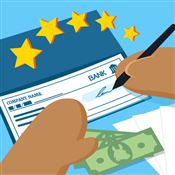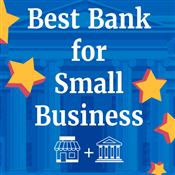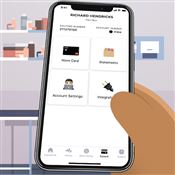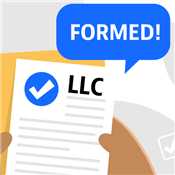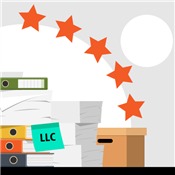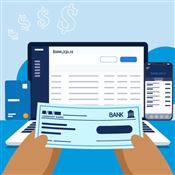Why You Need a Business Bank Account
Ad Disclosure: This article contains references to products from our partners. We may receive compensation if you apply or shop through links in our content. This compensation may impact how and where products appear on this site. You help support CreditDonkey by using our links.
Learn about the benefits of business bank accounts, the best accounts available, and the consequences of using a personal account for business expenses.
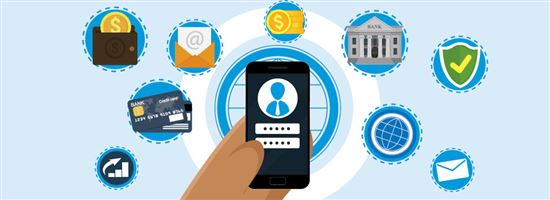 |
Do you run a small business? Then you should probably have a business bank account.
In fact, you may even be legally obligated to do so.
In this guide, find out how a business bank account benefits your business and what you need to apply. Plus, get our top picks for the best business bank accounts right now.
Do You Need a Business Bank Account?
The first step is to determine whether you are legally or contractually required to have a business bank account for your particular type of business. Let's review.
- LLC: Yes, required by law
- Sole Proprietorship with DBA: Yes, required by law
- Sole Proprietorship without DBA: Optional
- C-Corporation: Yes, required by law
- S-Corporation: Yes, required by law
5 Advantages of Having Business Bank Account
There's no single primary reason to have a separate business bank account - there's actually three: Simplified bookkeeping for tax season, professionalism, and access to business loans.
Review those factors, plus other important considerations, below:
- Easy Bookkeeping: When tax season comes around, a business bank account makes it simple to track revenue and separate business expenses from your personal purchases.
- Proving Legitimacy to the IRS: In the event of an audit, you need to be able to prove to the IRS that your business is not just a hobby. Well-maintained books and a dedicated business bank account go a long way in this regard.
- Access to Business Loans: If you want to apply for a business loan, many financial institutions may require you to have a business account.
- Showcasing a Professional Image: If you write checks for business expenses, having your business name on the check helps you appear more professional.
- Building Bank Relationships: Your odds of getting a business line of credit or loan are better if you have a good relationship with your bank. Opening a business bank account is the first step toward establishing this relationship.
If you are a freelancer or sole proprietorship doing business under your own name and Social Security number, you are legally allowed to use your personal account.
3 Consequences of Not Having a Business Account
If you use your personal bank account for business purposes, you run the risk of facing consequences that range from mildly inconvenient to financially destructive.
- Increased Fraud Risk: More activity means a higher likelihood of fraud (intentional or not). Plus, you can protect your personal information by opening a business account using your Employer Identification Number (EIN) instead of your Social Security number. In the event your business account gets hacked, the scammer won't have access to all of your information.
- Can't Receive Business Loans: If you ever require a loan to expand, make a significant purchase for your business, or pay off debt, a business bank account may be essential depending on your business type.
- Overcomplicated Record-Keeping: Combining personal and business expenses in one account makes keeping track of expenses for tax write-offs like trying to find a needle in a haystack. A dedicated business account keeps things simple.
The 5 Best Bank Accounts for Small Business
 |
When searching for the perfect business bank account for you, look for low fees, high rewards, and features and services tailored to business owners. Here are five of the top business bank accounts available today.
Chase Business Complete Banking: Best Overall
Chase offers a unique business checking account that comes with built-in payment processing. This makes it great for local retailers, food, and service businesses that take payment by credit cards.
When you take card payments with Chase QuickAccept, you can get the funds deposited into your checking account the same day. This is really helpful to keep your cash flow moving.
If your business also takes cash, you get up to $5,000 in cash deposits for free each month.
Chase Bank also offers complete business solutions, including business credit cards, loans, and merchant services.
Bank of America: Best for Flexibility
Bank of America's Business Advantage Banking is a flexible business account with 2 settings.
The basic tier has no fee for the first 20 transactions per statement cycle, plus no fee for first $5,000 in cash deposited per statement cycle at an ATM or Financial Center.
As your business grows, you can upgrade to the next tier with higher no-fee transactions and cash deposit limits. If your business needs change, you can switch between the tiers anytime.
Another cool feature is the Cash Flow Monitor tool. You can connect with apps like Quickbooks and Expensify to get an overview of your business in one place. It'll even give you cash flow projections so you have an idea of what to expect.
Business Advantage Fundamentals™ Banking
- No fee for first 20 transactions per statement cycle
- No fee for first $5,000 in cash deposited per statement cycle at an ATM or Financial Center
- Minimum Deposit to Open: $100
- Balance Requirement: None
- Monthly Fee: $16 or $0 – Great news, there's no monthly fee for the first 12 statement cycles. To avoid the Monthly Fee after, meet one of the following requirements each statement cycle:
- Maintain a $5,000 combined average monthly balance.
- Use your Bank of America business debit card to make at least $500 in new net qualified purchases.
- Become a member Preferred Rewards for Business.
- APY: N/A
Wells Fargo: Best Cost-Conscious Large Bank
Wells Fargo Initiate Business Checking Account is one of the best checking accounts from a big bank. It's a solid choice for new small businesses, as it's pretty easy to waive the monthly fee. The opening minimum deposit is just $25.
We also like Wells Fargo because of its comprehensive offerings and convenient locations. It's a good choice if you want everything in one place.
Besides banking, Wells Fargo also offers:
- Full-service payroll features and employee benefits
- Customized merchant processing options
- Tax programs
- Business credit cards
- Various business loan options
- Small business insurance
Initiate Business Checking
- 100 free transactions each fee period
- $5,000 in cash deposits processed free each fee period
- $25 minimum opening deposit
- Waive the $10 monthly service fee by maintaining a $500 minimum daily balance or a $1,000 average ledger balance, OR own a Premier® Checking, Private Bank Checking, or Private Bank Interest Checking account
The information for Initiate Business Checking has been collected independently by CreditDonkey. The details on this page have not been reviewed or provided by the bank.
- Balance Requirement: $500 minimum daily balance to waive $10 fee
- Monthly Fee: $10 (can be waived)
- ATMs: 11,000+ nationwide
Bluevine: Best Bank for Smaller Businesses
Bluevine, a fintech banking platform, is super popular for the high interest rate on your checking balance.
Bluevine also boasts no monthly service fees, no minimum balance requirements, no overdraft or returned check fees, and participates in the MoneyPass ATM network for fee-free cash withdrawals.
You can also deposit cash at Green Dot locations and Allpoint+ ATMs (fees apply), and you get 1 free checkbook for the life of your account with the free Standard plan. You can also issue up to 8 additional debit cards for authorized users at no extra cost.
Bluevine makes it easy to get paid with integrated invoicing and secure payment links. From your dashboard, you can create and send unlimited branded invoices and share payment links powered by Stripe. These links allow customers to pay using multiple methods, with funds deposited directly into your Bluevine account.
Free Business Checking - Earn $500 Bonus
To earn the $500 bonus, customers must apply for a Bluevine Business Checking account anytime between now and 01/31/2026 using the referral code CD500.
After opening your account, deposit a total of $5,000 within the first 30 days. After 30 days, maintain a minimum daily balance of $5,000 while also completing at least one of the following eligibility requirements every 30 days for 90 days:
- Deposit at least $5,000 from eligible merchant services to your Bluevine account OR
- Make at least $5,000 of outbound payroll payments from your Bluevine account using eligible payroll providers OR
- Spend at least $2,000 on eligible transactions with your Bluevine Business Debit Mastercard® and/or Bluevine Business Cashback Mastercard®
Banking services provided by Coastal Community Bank, Member FDIC
Novo: Best Bank for Sole Proprietors
Novo may not offer APY, but they do offer an extensive list of business perks that are sure to turn heads.
The Novo app seamlessly integrates with popular business services such as QuickBooks, Shopify, Slack, and Stripe.
This up-and-comer also offers steep discounts on business utilities, such as discounts on payroll tools and card processing with Stripe.
Free Business Checking
- $0 monthly service fee
- $50 deposit to unlock all features
- ATM fee refunds up to $7 per month
How to Open a Business Bank Account
Step 1: Choose the Right Account for You
Different business bank accounts will be better for your needs depending on the type of business you run and how established your company is.
For example, Novo might be great for freelancers and startups, but they frankly would not be able to accommodate the cash flow needs of more established small businesses.
Step 2: Search for Offers
Banks — especially giant traditional banks like JPMorgan — don't stay in business by handing out free money. However, many banks have business checking bonuses throughout the year.
Step 3: Gather Necessary Documentation
The final step before you apply is to gather all required documentation. This can include:
- Your Social Security number or EIN number (whichever you use to conduct business and file taxes)
- Two forms of identification, such as a valid driver's license, passport, state issued ID card, or Social Security card
- "Doing-business-as" (DBA) certificate if your business operates using a different name than your own (also called a "fictitious business name certificate")
- Business licenses (applicable only if you run a business that is required by law to be licensed)
- Corporation documentation such as corporate resolution, corporate charter, and articles of incorporation (applicable to S-Corp and C-Corp companies)
What the Experts Say
CreditDonkey asked industry experts to answer readers' most pressing questions. Here's what they said:
The Bottom Line
Opening a business banking account can make your life easier, simplify tracking expenses and income, and may even be required by law depending on the type of business you run.
In the unlikely event of an audit by the IRS, a business bank account will help protect you by providing a clean and easily accessible paper trail of all your business activities.
One last tip: Always be sure to shop around online for the best deals and promotions.
Business Checking Account - $400 Bonus
- Open a new Truist Simple Business Checking or Dynamic Business Checking account online, via phone, or in a branch from 10/1/2025 through 4/2/2026 and earn $400 by making Qualifying Deposits* of $2,000 or more into your account within 30 days of account opening. Must be a new Truist business checking client, Terms Apply.
- Enrollment in the promotion is required at the time of account opening using promo code SB25Q4BIZAFL to be eligible for a promotion reward. Please refer to the Account Opening & Promotion Enrollment sections below for instructions.
- *Qualifying Deposits for new business checking accounts exclude debit card credit transactions and NSF fee refunds. Deposits can be made on a one-time basis or cumulatively over the 30 days.
Free Checking Account for Small Business Owners
- Sign up in 3 minutes; no credit check
- No account fees - $0 monthly fee, overdraft fee, foreign transaction fee, or ATM fees at approximately 40,000 locations
- Automatic Savings
- Get paid up to 2 days early
Bank of America® Business Advantage Banking Checking Account - $200 Bonus Offer
- The $200 bonus offer is an online only offer and must be opened through the Bank of America promotional page.
- The offer is for new eligible business checking customers only.
- Offer expires 12/31/2025.
- To qualify, deposit $5,000 or more in New Money* directly into a new eligible Bank of America Business Advantage Banking account within thirty (30) days of account opening.
- Maintain an average balance of $5,000 in that new Business Advantage Banking account during the Maintenance Period**.
- Once all requirements are met, Bank of America will attempt to pay bonus within 60 days.
- Additional terms and conditions apply. See offer page for more details.
- *New Money is new funds deposited into your business checking account that are not transfers from other Bank of America deposit accounts or
Merrill investment accounts.
- ** The Maintenance Period begins thirty-one (31) calendar days after account opening and ends ninety (90) calendar days after account opening.
- Bank of America, N.A. Member FDIC
U.S. Bank Business Essentials - $400 Bonus
Promo code Q4AFL25 MUST be used when opening a U.S. Bank Business Essentials®, or Platinum Business Checking account. Limit of one bonus per business. A $100 minimum deposit is required to open one of the referenced accounts.
Earn your $400 Business Checking bonus by opening a new U.S. Bank Business Essentials account between 10/01/2025 and 1/14/2026. You must make deposit(s) of at least $5,000 in new money within 30 days of account opening and thereafter maintain a daily balance of at least $5,000 until the 60th day after account opening. You must also complete 5 qualifying transactions within 60 days of account opening.
Qualifying transactions include debit card purchases, ACH credits, Wire Transfer credits and debits, Zelle credits and debits, U.S. Bank Mobile Check Deposit or Bill Pay or payment received via U.S. Bank Payment Solutions. Other transactions such as (but not limited to) other Person to Person payments, transfers to credit card or transfers between U.S. Bank accounts are not eligible.
New money is considered money that is new to U.S. Bank. Funds must come from outside U.S. Bank and cannot be transferred from another U.S. Bank product or a U.S. Bank Affiliate. For accounts opened on non-business days, weekends or federal holidays, the open date is considered the next business day. Account fees (e.g., monthly maintenance, paper statement fee, etc.) could reduce the qualifying daily balance, therefore you must make deposit(s) to cover the fees to maintain the daily balance during the qualifying period to be awarded the bonus. Refer to the Business Pricing Information or Business Essentials Pricing Information Document for a list of fees.
Bonus will be deposited into your new eligible U.S. Bank Business Checking account within 30 days following the last calendar day of the month you complete all of the offer requirements, as long as the account is open and has a positive available balance.
Offer may not be combined with any other business checking account bonus offers. Existing customers (businesses) with a business checking account or customers (businesses) who had an account in the last 12 months, do not qualify.
All regular account-opening procedures apply. For a comprehensive list of checking account pricing, terms and policies, reference your Business Pricing Information or Business Essentials Pricing Information and YDAA disclosure. These documents can be obtained by contacting a U.S. Bank branch or calling 800.872.2657.
Bonus will be reported as interest earned on IRS Form 1099-INT and recipient is responsible for any applicable taxes. Current U.S. Bank employees are not eligible. U.S. Bank reserves the right to withdraw this offer at any time without notice. Member FDIC
North One Free Business Banking - Up to 2.50% APY
- 2.50% APY on balances up to $250,000 for eligible customers
- Business banking for teams
- Automatic invoice ingestion and payments
- Sales and revenue analytics
- Unlimited account envelopes
- Close to 100 integrations
- Over $5000 in perks for new customers
- No monthly fees, no application fees, no minimum balance
North One is a financial technology company, not a bank. Banking services provided by The Bancorp Bank, Member FDIC.
Free Business Checking - Earn $500 Bonus
To earn the $500 bonus, customers must apply for a Bluevine Business Checking account anytime between now and 01/31/2026 using the referral code CD500.
After opening your account, deposit a total of $5,000 within the first 30 days. After 30 days, maintain a minimum daily balance of $5,000 while also completing at least one of the following eligibility requirements every 30 days for 90 days:
- Deposit at least $5,000 from eligible merchant services to your Bluevine account OR
- Make at least $5,000 of outbound payroll payments from your Bluevine account using eligible payroll providers OR
- Spend at least $2,000 on eligible transactions with your Bluevine Business Debit Mastercard® and/or Bluevine Business Cashback Mastercard®
Banking services provided by Coastal Community Bank, Member FDIC
No-Fee Business Checking
- $0 monthly service fee
- $0 minimum opening deposit
- Open up to 20 individual business checking accounts
- Earn up to 3% APY with automated savings
- Issue up to 50 Visa® debit cards to your team
Free Business Banking for the Self-Employed
- Banking, taxes, bookkeeping – all in one place
- Automatically find tax write-offs and save for taxes
- Track and categorize expenses with custom rules
- Free unlimited custom invoices
- Easy sign up; no credit check
Free Business Checking
- $0 monthly service fee
- $50 deposit to unlock all features
- ATM fee refunds up to $7 per month
Basic Business Checking - Up to $200 Bonus
- Open a Basic Business Checking account using promo code START200 by June 30, 2026.
- Every dollar counts when you're starting out. That's why new businesses can earn up to $200 opening a new Basic Business Checking account today.
- No initial deposit requirement
- No minimum balance requirement
- No monthly maintenance fees
- Free domestic incoming wires. Two (2) outgoing domestic wire fees reimbursed per month.
- Unlimited domestic ATM fee reimbursements
- Unlimited item processing (debits, credits, and deposited items)
- Cash deposits via MoneyPass and AllPoint networks
Write to Justin Barnard at feedback@creditdonkey.com. Follow us on Twitter and Facebook for our latest posts.
Note: This website is made possible through financial relationships with some of the products and services mentioned on this site. We may receive compensation if you shop through links in our content. You do not have to use our links, but you help support CreditDonkey if you do.
|
|
| ||||||
|
|
|











